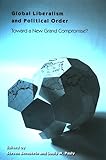Global liberalism and political order : Ttoward a new grand compromise
Publication details: Albany State University of New York Press 2007Description: 231pISBN:- 9780791470459
- 327.100000 BER
| Item type | Current library | Shelving location | Call number | Status | Barcode | |
|---|---|---|---|---|---|---|
 BOOKs
BOOKs
|
National Law School | NKCR SECTION | 327.1 BER (Browse shelf(Opens below)) | Not For Loan | 32064 |
Description:
Many years ago, John Gerard Ruggie coined the phrase "embedded liberalism" to describe the grand post-1945 political compromise between free-market liberalism and domestic political interventionism that stabilized the multilateral economic order. In Global Liberalism and Political Order, leading scholars of political economy and international relations assess the challenges facing today's increasingly interdependent world as globalization redefines the old political order. They address the unraveling and/or reinvention of a grand compromise in global governance from a variety of theoretical perspectives and issue areas, including trade, finance, networked governance, North-South relations, and the environment. Focusing on the foundations of political authority at the global level, the contributors imagine the implications of success or failure for international economic order and political stability. Ruggie, whose work inspired many of this book's scholars, contributes a chapter on the prospects for a new global--as opposed to international--grand bargain.
There are no comments on this title.
